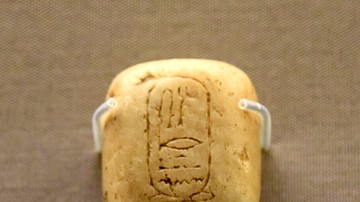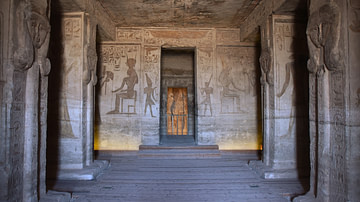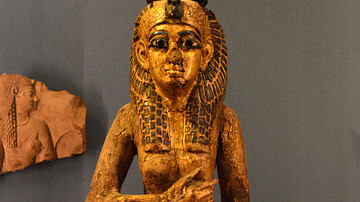Search
Did you mean: Egyptian Hieroglyphs?
Search Results

Article
Ancient Egyptian Taxes & the Cattle Count
The gods of ancient Egypt freely gave their bounty to the people who worked the land, but this did not exempt those farmers from paying taxes on that bounty to the government. Egypt was a cashless society until the Persian Period (c. 525...

Definition
Hatshepsut
Hatshepsut (r. 1479-1458 BCE) was the first female ruler of ancient Egypt to reign as a male with the full authority of pharaoh. Her name means "Foremost of Noble Women" or "She is First Among Noble Women". She began her reign as regent to...

Image Gallery
A Gallery of Ancient Egyptian Architecture
Architecture in ancient Egypt reflected the Egyptian culture's values, primarily that of ma'at (harmony/balance) symbolized by the symmetry of the completed works. Exteriors and interiors were carefully planned and executed in accordance...

Article
Music & Dance in Ancient Egypt
Music and dance were highly valued in ancient Egyptian culture, but they were more important than is generally thought: they were integral to creation and communion with the gods and, further, were the human response to the gift of life and...

Article
The Economy of Ptolemaic Egypt
Ptolemaic Egypt rapidly established itself as an economic powerhouse of the ancient world at the end of the 4th century BCE. The wealth of Egypt was owed in large part to the unrivalled fertility of the Nile, which served as the breadbasket...

Image Gallery
A Gallery of Ancient Egyptian Tombs, Coffins, and Grave Goods
Ancient Egyptian burial practices were observed as early as the Predynastic Period in Egypt (c. 6000 to c. 3150 BCE) and continued through the Ptolemaic Dynasty (323-30 BCE), serving to not only provide the living with closure in saying goodbye...

Definition
The Ankh
The Ankh is one of the most recognizable symbols from ancient Egypt, known as "the key of life" or "cross of life" and dated to the Early Dynastic Period (c. 3150 - 2613 BCE). It is a cross with a loop at the top sometimes ornamented with...

Article
The Gifts of Isis: Women's Status in Ancient Egypt
An inscription on an Egyptian papyrus dating from the 2nd century CE relates that the goddess Isis, bestowing gifts on humanity at the beginning of time, gave as much power and honor to women as she did to men. This brief passage reflects...

Image Gallery
A Gallery of Ancient Egyptian Art
Ancient Egyptian art was created to serve a practical purpose, not for its own sake, and so every piece had a specific function. At the same time, these works were crafted in accordance with the cultural value of ma'at (harmony) and so attention...

Definition
Ergamenes
King Ergamenes (also known as King Arkamani I, r. 295-275 BCE) was the greatest king of the city of Meroe, Kingdom of Kush (located in modern-day Sudan) who broke free from Egyptian dominance to help direct a wholly distinct culture. The...